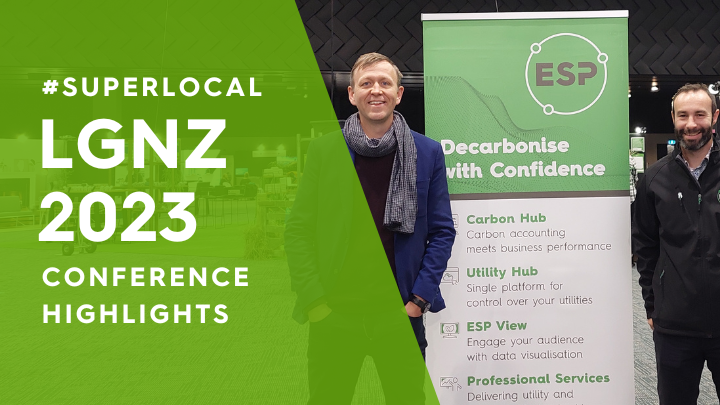
News, Decarbonisation, Energy Efficiency
Superlocal 2023: Councils and Climate
SuperLocal’23 was the talk of the town, marking the highlight of the year for local government leaders. From elected officials like mayors to chief executives from council-controlled organisations, the event was a meeting of minds, committed to tackling shared challenges. As a company that works closely with several councils, we made sure not to miss it. We attended not just to show our unwavering support for the sector, but also to gain a deeper understanding of the key themes around climate change and local governance.
What we observed
The discourse at SuperLocal'23 echoed a shared understanding: climate change isn't just increasing the economic burden on local governments. It's also heightening the complexity of risk management for councils. From the concept of managed retreat affecting particular places and assets, to the possible backlash and legal implications of greenwashing claims; from the hazards of non-compliance with environmental regulations to the threat of negligence in climate change initiatives – the challenges are multifold and significant.
Moreover, not all risks come with a forewarning. Some are conspicuous, like the possibility of flooding or coastal retreat. Yet, others are insidious. An example that emerged was the risk of increased tropical diseases as our climate gets warmer.
Anecdotal evidence also pointed towards a prevailing challenge - driving change. Councilors commented that ensuring all council decisions align with wellbeing or climate objectives was an uphill battle. While outright climate denial isn't tolerated anymore, the presence of 'naysayers' can still impede progress.
Council’s response
In response to these challenges, councils are rallying behind the idea of collective action and partnerships. Pooling resources, sharing best practices, and developing proven approaches are emerging as key strategies for better outcomes. The aim is to institute policies with lower perceived uncertainty, reducing the risk and the resistance from 'naysayers.'
There's no shortage of leaders willing to drive this action. However, the fear of stepping into the unknown, of investing in outcomes that aren’t assured, can often make them hesitant.
The bar will go higher
Adding to the air of uncertainty is the current status of legislations around emission reporting. While local councils aren't legally required to provide emission reporting yet, it's been recommended by the auditor general to start from 2026. Councils are well aware that the bar is about to be raised even higher.
How we can help
As active partners with several councils, we know the ins and outs of navigating climate risk, and we're here to help councils tackle these challenges head-on.
A primary method of our assistance is through the creation of data-led insights that evaluate the impact of new investments or emission reduction policies. Using this data, we can build persuasive business cases, minimize uncertainty, and provide a solid basis for action that even the staunchest 'naysayers' can't refute.
Next, we can work directly with councils to reduce their emissions. We believe in the power of 'quick wins' - those immediate, impactful changes that demonstrate tangible progress. Not only do these quick victories boost credibility, laying the groundwork for future climate action, but they often bring about significant cost savings. These savings can then be reinvested into more comprehensive, longer-term climate efforts.
Lastly, we extend our support to councils with operational assets, simplifying what could otherwise be an overwhelming administrative burden of reporting complex emissions profiles.
Together, these strategies showcase how we are well equipped to help councils move from risk to resilience, turning climate challenges into opportunities for sustainable growth. We're eager to continue these partnerships, and support councils in building a future that is both sustainable and resilient.
Inspired by the insights shared at Superlocal 2023 ? Take the next step in your sustainability journey by exploring our range of resources and tools designed to help councils and public organisations navigate the transition to a low-carbon economy.


